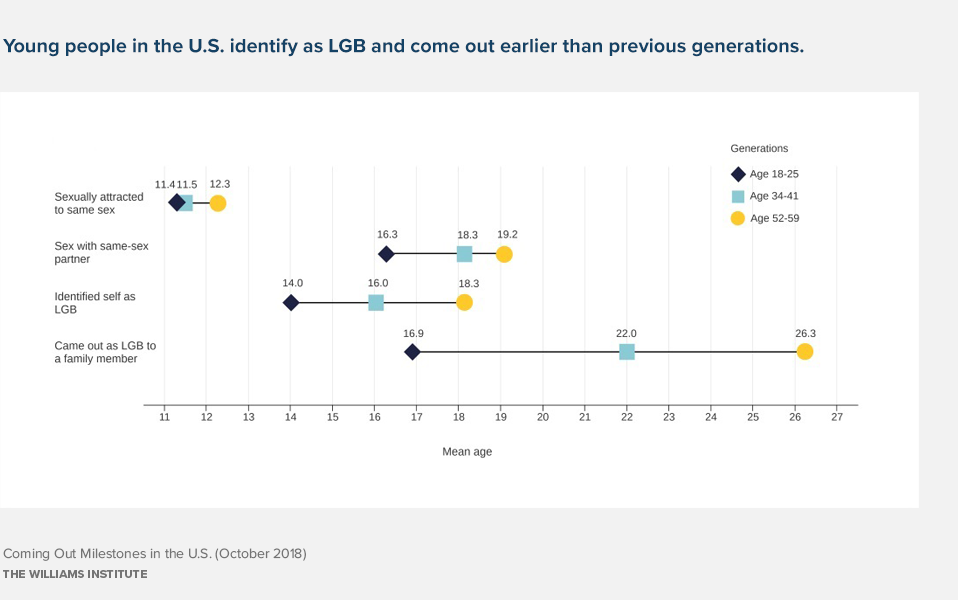New findings from the Generations study, a study of a representative sample of lesbians, gay men, and bisexuals (LGB) in the United States, show marked differences in coming out experiences among three generations of LGB people: young (ages 18–25 years), middle (34–41 years old) and older (52–59 years old). LGB people of these generations reported similar ages of being sexually attracted to a same-sex person. But there were marked differences in ages when they identified themselves as LGB and when they came out as LGB to a family member. On average, LGB people in the younger generation identified as LGB at the age of 14, the middle generation identified as LGB at 16, and the older LGB generation identified around the age of 18. Younger LGB people came out to a family member around the age of 17, while the middle and older LGB generations came out around ages 22 and 26, respectively.
Coming Out Milestones in the US
New findings from the Generations Study, a representative sample of lesbians, gay men, and bisexuals (LGB) in the United States, show marked differences in coming out experiences among three generations of LGB people.
These findings come from three survey questions related to coming out milestones asked to participants in the Generations Study, a five-year study of lesbians, gay men, and bisexuals. The study explores identity, stress, health outcomes, and health care and services utilization among LGBs in three generations (ages 18-25, 34-41, and 52–59 at the time of baseline data collection in 2016–2017). The study investigators targeted these generations to represent U.S. adults who came of age during different historical contexts. The study aims to assess whether younger cohorts of LGBs differ from older cohorts in how they experience stress related to prejudice and everyday forms of discrimination, and whether patterns of resilience differ between different LGB cohorts. Additionally, the study aims to examine how differences in stress experience affect mental health and well-being, including depressive and anxiety symptoms, substance and alcohol use, and suicide ideation and behavior, and how younger LGBs utilize LGB-oriented social and health services, relative to older cohorts. More about the study can be found here. Information about our sister study of a representative sample of transgender people in the United States can be found here.
Generations is funded by a grant from the Eunice Kennedy Shriver National Institute of Child Health & Human Development (NICHD grant 1R01HD078526) and through supplemental grants from the National Institutes of Health, Office of Behavioral and Social Sciences Research and the Office of Research on Women’s Health. The Generations investigators are Ilan H. Meyer, Ph.D., (PI), David M. Frost, Ph.D., Phillip L. Hammack, Ph.D., Marguerita Lightfoot, Ph.D., Stephen T. Russell, Ph.D. and Bianca D.M. Wilson, Ph.D. (Co-Investigators, listed alphabetically).
